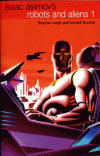I thought it would be appropriate to write a little mini review of the entire Robot City series before starting on the individual books since I have read this series once before. I won’t go into any spoilers, just give a general feel for the series. Each novel begins with an introduction by Isaac Asimov which is a nice addition to each of the novels. As stated in the introduction for the first book, this series is the first time Asimov has allowed any other authors to write in the world he created. Essentially he had final say on anything that went into the books and was consulted to make sure the authors didn’t overstep their authority. The introductions themselves sometimes reveal minor plotline spoilers for the current book, but nothing major except for book six. I recommend reading the book six intro after you finish, but that’s up to you.
This series is really meant to be read as whole. It takes place approximately 20 years before Robots and Empire by Isaac Asimov. I chose to read Robots and Empire before this series. The first book really gives you a glimpse at what might happen in the following books. Book one is full of questions, very few answers, and can be best described as an “introduction” like the first 20 minutes of a movie. I was hooked on the series after the first book. Each book is only about 200 pages with short chapters so it is easy to just pick it up and read a little bit without having to stop in the middle of a chapter. There is a general consistency in the writing of the various authors in all 6 of the novels comprising the series. It really doesn’t feel like you are adjusting to a new author for each book. Overall, the series is a worthwhile addition to the universe that Asimov created.

